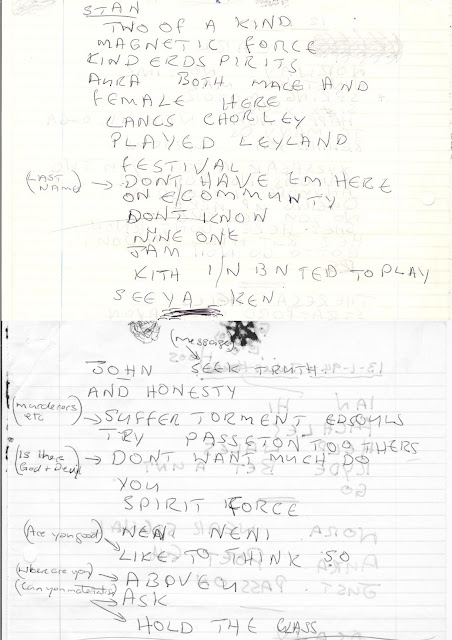One of the ongoing challenges at this time was the weekly, often twice-weekly visit I would make to Ernestine’s house, something I wrote about earlier in this chapter (part II, session 8th April 1994, ((post: May 1st 2013)).
It may be hard to imagine just how much a lady in her late eighties, wanting to develop her classical guitar playing, could be so exasperating, yet with a degree of predictable regularity exasperating she was, so much so that when the ‘so called’ lesson would end, I’d usually leave her house feeling exhausted. Officially, the lessons were forty five minutes in duration, but for a needy woman such as Ernestine, not only were my visits seen as more a social occasion, but the intended time frame was considered irrelevant.
A requirement unspoken and vague, yet expertly imposed - for her the lessons needed to last two or three times the official length. Of course, this kind of manipulation, successful as it was, always requires willing compliance, and mine came in the form of an inability to find a tactful and gracious way of bringing things to a close - a way that would leave her without a scowl on her face, and me without guilt.
She first contacted me after I’d placed an ad for guitar tuition in the local newspaper; her story, so she told me some time later, was that she’d cut out the advertisement, carried it around in her pocket for weeks not knowing whether or not I could be trusted, and then it wasn’t until she saw her late Father’s face superimposed on the cutting one day that she felt she knew it was safe to call me. As a result of this I was, in her mind, the incarnation of her father.
Well, if all that isn’t enough to get the warning lights flashing I’m not sure what is.
To be fair, in retrospect I’d have to say she was most likely in the early stages of dementia, so as time progressed so did her condition. But also to be fair to myself, how could it be anything other than frustrating when every single hand movement, finger placement, fret position and string number had to be instructed at a deafening volume level - and it was easier to make myself heard than it was to be understood.
She was a demanding lady. I would feel stressed before I even arrived. Yet despite all of this I did have a soft spot for her, and was unable to walk away, feeling in some way that I had a role to play in contributing something to her life. I can certainly say that she made a significant contribution to mine.
Bit by bit it became apparent that Ernestine was moving a notch or two further into a more advanced stage of her condition as she told of plans to get a caravan and horse, and asked me to travel the country with her.
Then came dramatic talk of floods that had been taking place with regularity in the street just outside her house, then finally, to top it all she tried to convince me that the woman masquerading as my partner was in fact not Carol but was indeed the moors murderer, Myra Hindley.
Ernestine inevitably ended up in a rest home, and what were once guitar lessons–albeit a questionable version–became straightforward visits, visits where she would tell of the meetings and conversations she’d been having with long deceased family members as they came to her room at night.
I always listened intently and took her seriously when she spoke about these things, not that I necessarily bought her stories one hundred percent, but I was, and still am quite open to these possibilities. When people move closer to death these are often the kind of words they speak, more just like passing conversation and in a tone that doesn’t even attempt to convince.
She finally joined those relatives at the age of ninety six.
I sang in the church at her funeral.
In her will she bequeathed me her record collection of 78s and LPs, and I also inherited her guitar which hangs on my studio wall to this day.

























